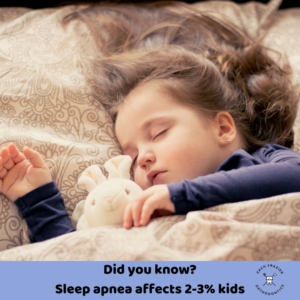When you hear the words sleep apnea, you probably don’t think much about kids. However, sleep apnea affects 2-3% of kids, and the symptoms are subtler than they are in adults. Children with sleep apnea may appear totally normal at a physical exam, but there are some signs to watch out for. This list is not all-inclusive, nor does it mean that any one of these indicates a problem. However, if some of these describe your child, it may be a good idea to consult with your family doctor about the possibility that sleep may a problem.
- Snoring – No child should snore – period. An occasional load breath may be heard, but your child should not be snoring or breathing loudly at night on a regular basis. Snoring in children goes hand-in-hand with sleep apnea, and this should definitely be brought the attention of your family doctor.
- Teeth grinding – Grinding teeth at night may be a defense mechanism for the body. If your child is struggling with proper airflow at nighttime (due to a collapsed airway, tonsils, adenoids, allergies, etc.), pushing the lower jaw forward often helps open the airway to allow a better passage of air down the throat. This protective measure for the body is helpful for breathing, but can really cause long lasting harmful effects on the teeth.
- Bedwetting – Typically, by around the age of 5, most kids will be able to sleep without wetting the bed. An accident here or there is much different than an older child who is wetting the bed frequently. Although this can be due to other medical conditions, bedwetting can be linked to sleep disorders as the body fails to awaken when the bladder is full.
- Mouth breathing – While humans are able to breathe through both the nose and the mouth, we are technically “obligate nasal breathers” as a species, meaning we are supposed to breathe through our nose. Deviated septum, allergies, and other nasal airway obstructions can make it difficult to breathe through the nose. Mouth breathing can affect the development of the face, jaws, and teeth position, often times leading to orthodontic treatment to normalize the effects of letting the mouth hang open all the time.
- ADHD – Sleep issues may contribute to problems relating to attention span. When some kids don’t get enough sleep, they actually act opposite of what we would expect – they actually become hyperactive rather than tired. Additionally, they may be irritable, unfocused, and easily distracted, and these consequences can have a very negative effect on school performance. Studies have shown that 1/3 kids with ADHD also snore while sleeping.
- Morning headaches – If your child’s airway is partially blocked while sleeping, the amount of oxygen in the blood will be reduced. This reduction in oxygen level may lead to headaches, specifically in the morning after waking from a poor night’s sleep.
- Sleepwalking and sleep talking – Typically if these are observed, they are usually shortly after going to bed and associated with “confused arousal.” This means that something startles the child awake, but they are still subconscious and may not be fully awake. This arousal may be from other medical conditions, but it may also be from airway obstruction that causes sleepwalking and/or sleep talking.
The bottom line is this – sleep is obviously important for all of us, but many kids with sleep issues are not being identified. As an orthodontist, I am a specialist in facial growth and development, and my job is to simply screen for some of these issues. I can fix some of the side effects on the teeth and jaws, but ultimately a physician (sleep specialist or ENT physician) needs to put all the pieces together to make a diagnosis. So, if you see these issues at home, or your dentist or orthodontist has mentioned some of them to you, make sure to follow up with your physician. Improving your child’s sleep very well could change their life, so the sooner we do it, the better : )
- Dr. Zach
